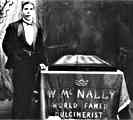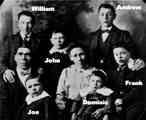William's parents were show people working in a circus. They travelled throughout Ireland, Scotland and England, where he was born in Stafford in 1870.
We don't know anything about him until he was about ten years of age, other than that he was taught to play the dulcimer by his mother. We now take up his story at this age.
His parents were heavy drinkers as most of the show people were. They had travelled to Oban on the west coast of Scotland. This was a fishing village with a natural deep harbour and is surrounded by hills. It attracted many wealthy people of the time. The family generally set up their show every summer on the outskirts of the town. It was at the end of one season that they decided to pack up and move south to Glasgow, about 100 miles away. Unaware that William was still in the town playing to tourists, his parents were well on their way before he was missed, and he was left stranded. He was unable to read or write at this time. This part of Scotland is very mountainous with narrow roads. It would have been too much of a risk for them to turn back with the winter closing in. In those days, kids were often left to fend for themselves, and that is exactly what he had to do.
During the winter months, the harbour master allowed him to sleep in a store room under the harbour pier, and the following spring his parents returned and they were reunited. They worked there for the summer and then returned to Glasgow, where they decided to settle down.
 |
As a young man, he played in various theatres around Scotland. It wasn't long before he was being recognised as a gifted musician. He returned frequently to Oban playing for wealthy guests in the big hotels. Around this time, his career really took off, and invitations to play at private parties and social events became more lucrative than the theatres. He also felt that his musical talent was more appreciated by playing classical pieces which he enjoyed himself. The Lord Provost of Glasgow said of him..."You are, I would say, the complete master of that instrument."
There were three highlights in his career - being invited to play on Sir Thomas Lipton's yacht during the race from England to America for the America's Cup, playing for the Prince and Princess of Wales, who were later to become King and Queen, when they were on their state visit to Glasgow, and last, but not least, being introduced to Sir Edward Elgar, the renowned conductor and composer. To be recognized by a man who wrote such wonderful music was his most treasured memory.
 |
He continued to play for many years travelling around both in Britain and Europe, but always found time to return to Oban, where his heart was. In his later years, most of his shows were for charity and he donated a large amount of money to help build a chapel in the town.
William McNally was very gentle-natured man with a nice sense of humour, he loved children. He was also a very devout Catholic, and most of his sons were altar boys.





